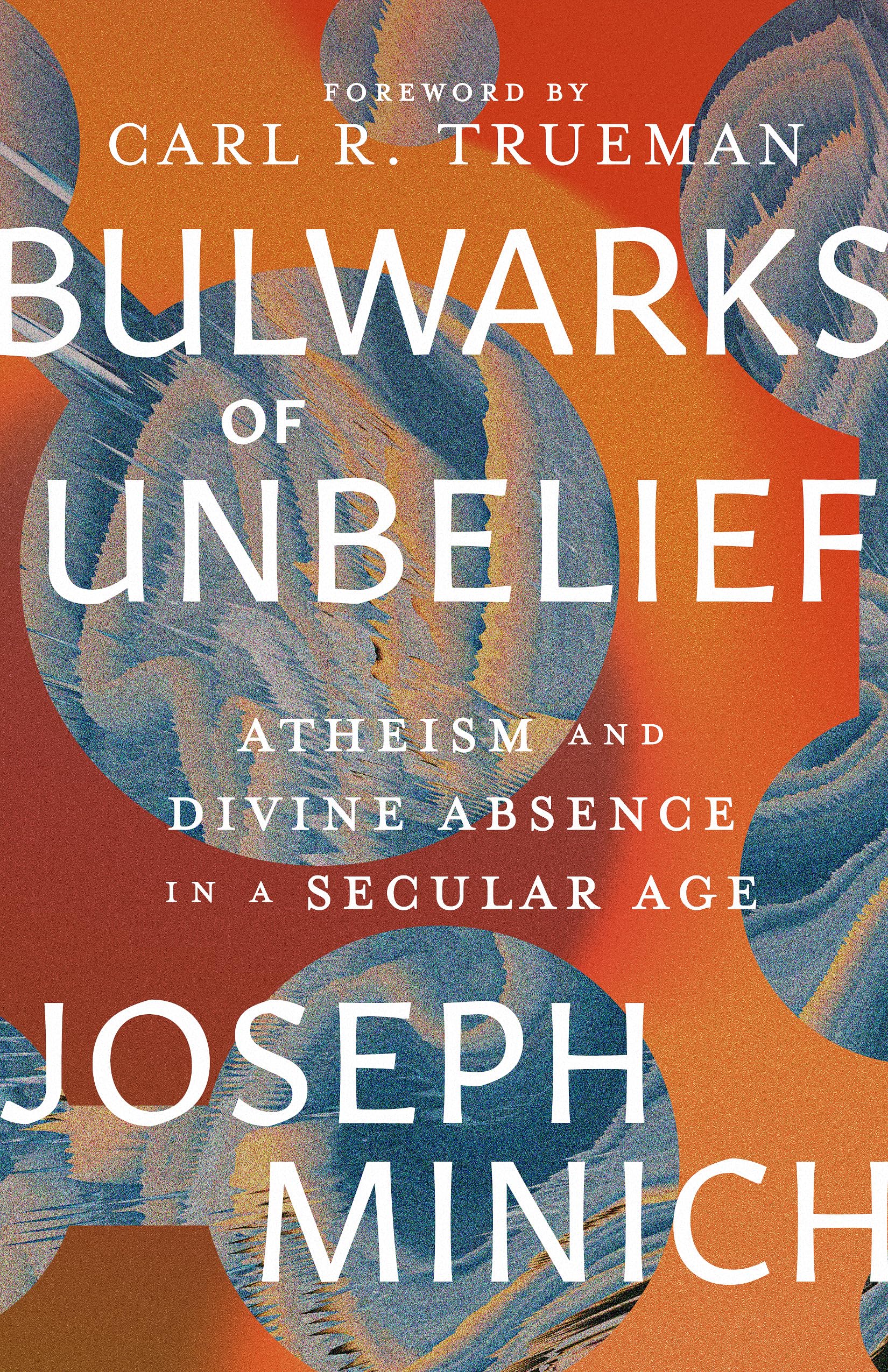After returning from space, Soviet cosmonaut Yuri Gagarin is alleged to have said: “I looked and looked but I didn’t see God.” This emphasis on the evident absence of God is the premise of modern atheism. In Bulwarks of Unbelief Joseph Minich argues that this is due to the technological effects of the Industrial Revolution, which changed our perception of reality, and therefore our perception of God’s existence. Our “sense of reality [changed] such that God’s non-obviousness is now felt to be an argument against His being at all (p. 7, emphasis his)”, causing those living in this present secular age to confuse God’s apparent silence with God’s absence. The way back to making belief in God plausible again, claims Minich, is to highlight God’s authorship of universal history. “All human cultivation ultimately moves between the poles of Genesis 1 and Revelation 22 (p. 243)” and focusses on the way in which we as individuals can contribute to that history. Bulwarks of Unbelief was an exciting book to read. I don’t think it is going too far to say that it has changed the way I evaluate and respond to our cultural moment.
Technology, Reality and Modern Atheism
Bulwarks of Unbelief is a densely argued, extensively footnoted, academic analysis explaining why atheism became a mainstream option for much of the modern world:
That is, whatever one believes propositionally about the question of God, God’s existence is not felt to be obvious in the same way that, for instance, the fact that you are reading this right now seems obvious (p. 5)

Bulwarks of Unbelief
Joseph Minich
Millions of people in the West identify as atheists. Christians often respond to this reality with proofs of God’s existence, as though rational arguments for atheism were the root cause of unbelief. In Bulwarks of Unbelief, Joseph Minich argues that a felt absence of God, as experienced by the modern individual, offers a better explanation for the rise in atheism. Recent technological and cultural shifts in the modern West have produced a perceived challenge to God’s existence. As modern technoculture reshapes our awareness of reality and belief in the invisible, it in turn amplifies God’s apparent silence. In this new context, atheism is a natural result. And absent of meaning from without, we have turned within.
I would summarise the big idea of Minich’s book in this way: the existence of God is no longer intellectually assumed or intuitively felt. This, argues Minich, is a byproduct of the Industrial Revolution. The result of which is that instead of perceiving ourselves as characters inside a larger, often uncontrollable cosmos, we are now passive consumers inside a technological society that has tamed our world. The Christian response begins with a recovery of the idea of a global history (of which God is the divine author) in which we participate.
Minich spells out the question carefully in chapter one, comparing his analysis with both the popular ‘subtraction story’ (God and superstition disappeared as we learnt more about the world), and popular genealogies of ideas and ideologies (for example, the narrative that the Enlightenment overemphasised monism and individual freedom; or “the advent of Darwinian evolutionary theory” destroyed belief (p. 31)). In chapter two, Minich invites us to observe the correlation between the full effects of the Industrial Revolution and the mainstreaming of ‘divine absence’. Technology radically changed the way people lived and worked, but it also changed the way they perceived reality and their involvement in the world. Minich argues in chapter three that this economic and cultural change altered our sense of agency and therefore how we perceived God:
Simplifying to the extreme, the world became a world of things at hand rather than a world of actors to which the human was subject (p. 142).
The last chapter was my favourite. In it, Minich sketches out a (Protestant) Christian response. He rejects both a Luddite revolution and techno-optimism as reasonable options [1]. Instead, we should see what God is teaching us in this present historical and cultural moment and be confident in asserting that it is God’s authorship of the grand narrative of history that provides meaning to our local participation in reality. The false assumption so dominant in the developed world is that God is absent, absent in the face of evil, absent from our scientific explanations, and absent in our daily lives. Once we have understood the way technology changes our perception of causation and the basic ways we live in our environment, we can think correctly about God in relation to our world. The correct questions are: What does God say about evil? What has God said about the way the world works? and what wisdom does God give us to live our daily ordinary lives?
Explaining Our Secular Culture: A Popular Sub-Genre
Explaining our current cultural secular moment is a popular sub-genre, represented by books such as A Secular Age by Charles Taylor and Dominion by Tom Holland. In his massive seminal book from 2007 Taylor describes the historical emergence and characteristics of this present secular age. In his book, Holland traces out the historical Christian origin of our modern society’s values and structures, and then what we have done with them, both positively and negatively. You could argue that since Augustine’s City of God, Christians have been seeking to understand how the gospel interacts with our cultural context. Two modern Evangelical examples come to mind. First, The Rise and Triumph of the Modern Self: Cultural Amnesia, Expressive Individualism, and the Road to Sexual Revolution, by Carl Trueman: a Christian critique of the modern individualistic mindset and all that it entails. Second, Biblical Critical Theory: How the Bible’s Unfolding Story Makes Sense of Modern Life and Culture by Christopher Watkin demonstrates that the critique can itself be a tool for Christians to analyse culture in the light of the gospel.
The contribution Bulwarks of Unbelief makes is to dig into how the plausibility of atheism, built on the premise of God’s ‘obvious’ absence, become so culturally compelling. Minich helpful clarifies the cause and experience of this implicit obviousness, and I believe that his technological explanation is correct. What is refreshing and exciting, is that his solution is his reaffirmation of the basic and sometimes overlooked Christian premise, that God is a communicator (‘The Author’) outside of history. Thus, we can recognise history as a thing in and of itself. Christians can therefore also embrace the freedom to participate in that history. All humans participate in God’s global history, when they create things and interact with each other. Christians have a unique advantage in that their creation is done in the context of the ordinary Christian life and therefore has eternal implications. We can consciously participate in an eternal history that is congruent with the divine author’s intended plotline! Seeing the world in this way correctly emphasises God’s communicative nature. This current cultural and historical moment characterised by widespread atheism in the developed world is not the product of cosmic confusion or divine absence but an opportunity to “persuade” people about the way God has communicated previously and the importance of your own personal creative agency in your local context (p. 254).
For readers therefore, there are three practical tools. Firstly, a conceptual response to the widespread assumption that God is absent from the world. Secondly, arising from that knowledge, the impetus to emphasise persuasion in our evangelism. Finally, the encouragement that a constructive social media comment, participation in a healthy online community or minor (godly) creative endeavours all contribute to God’s global history.
Bulwarks of Unbelief has sharped my thinking and has given me confidence to correctly diagnose and respond to the modern moment. It is a challenging read. For example, I could not understand the excursus about Heidegger in chapter three. But the book rewards the work it requires of the reader. I was not previously able to articulate why atheism was plausible, did not quite catch the full significance of the Industrial Revolution, and was delighted to have my pre-existing hunches about how to respond to the perceived absence of God confirmed and clarified. Aside from helping Christians analyse the rise of atheism, Minich gives Christians an important Apologetic tool. It is philosophically incorrect to think of God as absent (this is just the byproduct of being passive recipients of a technological culture that seeks to control agency), instead we should think of when and where God has spoken.
[1] Luddites were organised groups of artisans who, during the advent of the Industrial Revolution, destroyed machinery that was replacing their work and livelihoods. The term luddite is now used to refer to anyone who rejects technology. Techno-optimism holds that technology will only make the world and people’s lives better, with no side-effects or unintended consequences.











